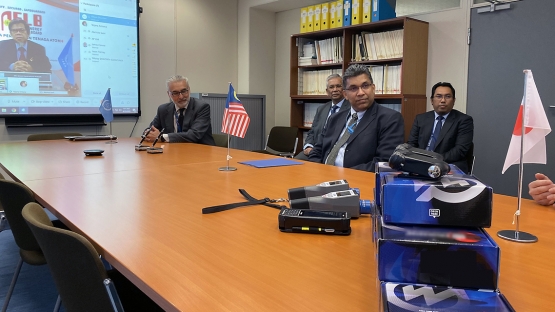The IAEA and the Atomic Energy Licensing Board of Malaysia (AELB) have established a pool of radiation detection equipment available for loan, backed by financial contributions from Japan, to support nuclear security training and detection capabilities at major public events in Asia and the Pacific. This is the first nuclear security equipment repository facilitated by the IAEA.
Under the terms of this agreement, the IAEA will station personal radiation detectors (PRDs), radionuclide identification devices (RIDs) and backpack radiation detectors (BRDs) at the Malaysia Nuclear Security Support Center (NSSC) operated by AELB. The equipment, purchased with Japan’s contribution to the IAEA Nuclear Security Fund, will support nuclear security capacity building and detection capabilities in the region.
The Malaysia NSSC and the IAEA will utilize the equipment to train front-line officers, such as customs and law enforcement personnel, in radiation detection techniques, to enhance capacity among experts on calibration and maintenance of radiation detection equipment for nuclear security, and lend equipment to support detection capabilities at major public events to prevent terrorist attacks using radioactive material.
“Nuclear or other radioactive material lost or stolen may mean a vulnerability at national facilities or borders, and this type of equipment is key to detecting such material,” said Raja Abdul Aziz Raja Adnan, Director of the IAEA Division of Nuclear Security. “This loaner pool of radiation detection equipment is an example of how international cooperation — in this case trilateral cooperation between the IAEA, Malaysia and Japan — can strengthen nuclear security.”
The agreement was signed by Adnan on behalf of the IAEA, and Mohd Pauzi Mohd Sobari, Director General of the Atomic Energy Licensing Board in Malaysia, at a virtual ceremony on the sidelines of the 64th IAEA General Conference in September.
“With this enhanced technical capacity, we look forward to leveraging our national capabilities and lessons-learned to enhance harmonised implementation of nuclear security in the region,” said Mohd Sobari, speaking from AELB headquarters in Kuala Lumpur.







